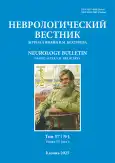Dissociative suffering: should we believe a patient's word?
- Authors: Mendelevich V.D.1, Nesterina M.K.1
-
Affiliations:
- Kazan State Medical University
- Issue: Vol LVII, No 1 (2025)
- Pages: 34-45
- Section: Clinical case reports
- URL: https://journal-vniispk.ru/1027-4898/article/view/292657
- DOI: https://doi.org/10.17816/nb643488
- ID: 292657
Cite item
Abstract
The article presents a clinical case of a 43-year-old patient, Jasmine, who sought psychiatric help due to "affects that interfere with life: dissociations, regressions, anhedonia, flashbacks, social phobia, asthenia, anxiety, and nightmares." The patient reported that she had consciously changed her place of residence and moved to a city "known for good psychiatrists" to receive qualified help. Over several years of "mental suffering," the patient thoroughly studied psychiatric literature, mastered scientific terminology, gained a deep understanding of the etiopathogenesis of mental disorders, and acquired knowledge of various psychotherapy and psychopharmacotherapy methods. The patient positioned herself as an expert in psychiatry. She independently identified dissociative symptoms (depersonalization, derealization, regression), and diagnosed herself with a dissociative disorder. It is concluded that modern psychiatry faces a new challenge in the objective diagnosis of mental and behavioral disorders — in particular, the widespread prevalence of self-diagnosis and the influence of patient expertise on this process. The issue of therapist trust in patient complaints is shifting from differentiating between genuine symptoms and malingering to assessing how "psychiatric literacy" impacts diagnosis.
Full Text
##article.viewOnOriginalSite##About the authors
Vladimir D. Mendelevich
Kazan State Medical University
Email: mendelevich_vl@mail.ru
ORCID iD: 0000-0002-8476-6083
SPIN-code: 2302-2590
MD, Dr. Sci. (Medicine), Professor
Russian Federation, KazanMaria K. Nesterina
Kazan State Medical University
Author for correspondence.
Email: mari.nesterina@mail.ru
ORCID iD: 0000-0001-6901-5903
SPIN-code: 5974-4048
Resident of the Department of Psychiatry and Medical Psychology
Russian Federation, KazanReferences
- Tse JSI, Haslam N. Broad concepts of mental disorder predict self-diagnosis. SSM. Mental Health. 2024;6:100326. doi: 10.1016/j.ssmmh.2024.100326 EDN: FDAGAB
- David AS, Deeley Q. Dangers of self-diagnosis in neuropsychiatry. Psychol Med. 2024;54(6):1057–1060. doi: 10.1017/S0033291724000308
- Mendelevich VD. About "subjective mental disorders", self-diagnostics and psychopathological alertness. Psychiatry and Psychopharmacotherapy. 2023;25(4):4–7. EDN: GDGBYN
- Knouse LE, Bagwell CL, Barkley RA, Murphy KR. Accuracy of self-evaluation in adults with ADHD: evidence from a driving study. J Atten Disord. 2005;8(4):221–234. doi: 10.1177/1087054705280159
- Lewis F. Exploring the experience of self-diagnosis of autism spectrum disorder in adults. Archives of Psychiatric Nursing. 2016;30(5):575–580. doi: 10.1016/j.apnu.2016.03.009
- Shih CH, Zhou A, Grider S, et al. Early self-reported post-traumatic stress symptoms after trauma exposure and associations with diagnosis of post-traumatic stress disorder at 3 months: latent profile analysis. BJPsych Open. 2023;9(1):e27. doi: 10.1192/bjo.2023.1
- Jessen F, Amariglio RE, Buckley RF, et al. The characterisation of subjective cognitive decline. Lancet Neurol. 2020;19(3):271–278. doi: 10.1016/S1474-4422(19)30368-0
- Wies B, Landers C, Lenca M. Digital mental health for young people: a scoping review of ethical promises and challenges. Front. Digit. Health. 2021;3:697072. doi: 10.3389/fdgth.2021.697072
- Jutel A. Self-diagnosis: a discursive systematic review of the medical literature. J Participat Med. 2010;2:e8S.
- Mendelevich VD. Terminological foundations of phenomenological diagnostics in psychiatry. Moscow: Gorodec; 2016. EDN: WQBUBJ
- Torrico TJ, French JH, Aslam SP, Shrestha S. Histrionic personality disorder. In: StatPearls. Treasure Island (FL): StatPearls Publishing; 2024.
- Yang M. Overview on histrionic personality disorder. Communications in Humanities Research. 2023;7(1):221–226. doi: 10.54254/2753-7064/7/20230886
- American Psychiatric Association. Diagnostic and statistical manual of mental disorders. Arlington, American Psychiatric Publishing; 2013. doi: 10.1176/appi.books.9780890425596
- Holyavin A, Zvonaryova O. The expertise of patient organisations: making patients’ voices heard. The Journal of Social Policy Studies. 2022;20(2):335–346. doi: 10.17323/727-0634-2022-20-2-335-346 EDN: QXFHHF
- Anselmetti C, Fourneret P, Gauld C. Trouble dissociatif de l’identité de l’adolescent: de l’autodiagnostic à la maladie transitoire [Dissociative identity disorder in adolescents: From self-diagnosis to transient illness]. Med Sci (Paris). 2023;39(4):377–379. French. doi: 10.1051/medsci/2023042
- Jaramillo JA. Down the rabbit hole of self-diagnosis in mental health. University of Colorado Denver; 2023.
Supplementary files






